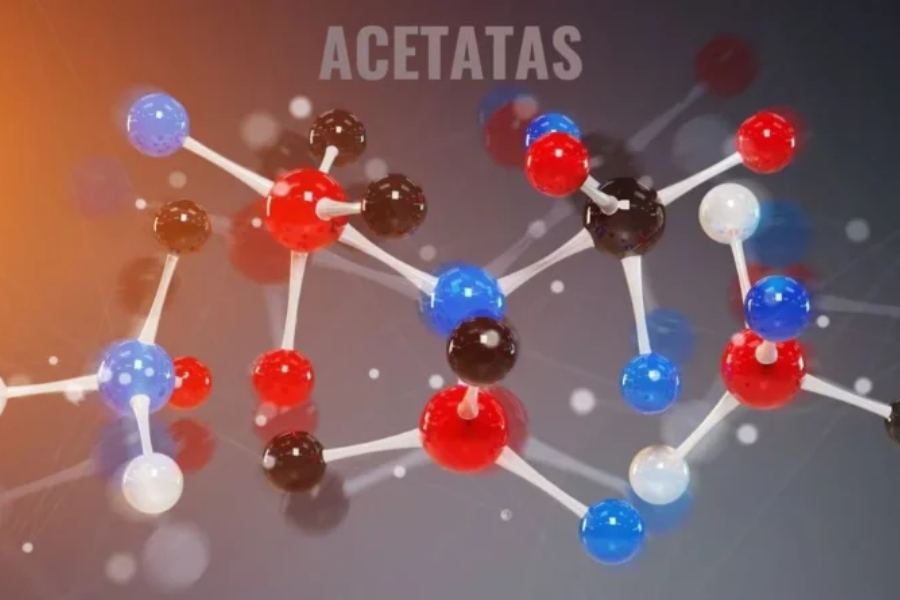Acetates: Uses, Benefits, and Safety in Various Industries
Acetates, or “acetatas,” are versatile compounds with widespread applications across industries like pharmaceuticals, textiles, food production, and manufacturing. Derived from acetic acid, acetates play a vital role in countless products and processes we use every day. This article explores what acetates are, their key uses, benefits, and the safety measures essential when handling them.
What are Acetates?
Acetates are chemical compounds consisting of the acetate ion (CH3COO−), formed as salts or esters when acetic acid reacts with bases or alcohols. Acetic acid, commonly found in vinegar, can combine with a base like sodium hydroxide to form sodium acetate (CH3COONa), a widely used type of acetate. When acetic acid reacts with alcohol, acetate esters such as ethyl acetate (CH3COOCH2CH3) are produced.
These compounds’ flexibility in chemical reactions allows them to serve various functions, making them highly valuable in different industries, including pharmaceuticals, textiles, food production, and industrial applications.
Common Uses of Acetates
- Pharmaceutical Industry
- Sodium Acetate: Used in the medical field as an electrolyte replenisher, sodium acetate is administered intravenously to correct low sodium levels. It also acts as a buffering agent in various medications, helping to maintain stability and proper pH levels in pharmaceutical formulations.
- Acetate Esters: Compounds like ethyl acetate are widely used as solvents during the production of pharmaceuticals, aiding in the extraction and purification of active pharmaceutical ingredients (APIs), ensuring the final product’s safety and efficacy.
- Textile Industry
- Cellulose Acetate: A major use of acetates in textiles is in producing cellulose acetate fibers, known for their silk-like appearance and durability. These fibers are used in fashion items, home furnishings, and linings, prized for their softness and strength.
- Food Industry
- Sodium Acetate: Commonly found as a preservative and flavoring agent, sodium acetate is widely used in snack foods like chips, where it enhances taste and prolongs shelf life by preventing bacterial growth.
- Industrial Applications
- Acetate Esters: Esters like ethyl acetate and butyl acetate are widely employed as solvents in products such as paints, coatings, adhesives, and inks. These compounds are essential in manufacturing processes for their ability to dissolve other substances, facilitating the application and drying of products.
- Cosmetics
- Ethyl Acetate: In the cosmetic industry, ethyl acetate is an effective ingredient in nail polish removers, efficiently dissolving nail varnish without excessive damage or dryness to the nails. Its gentle yet potent nature makes it a go-to solvent for personal care products.
Benefits of Acetates
- Versatility
Acetates can adapt to various applications, making them essential across numerous industries. Their ability to engage in diverse chemical reactions ensures their wide-reaching utility in pharmaceuticals, textiles, food, and industrial products. - Safety in Pharmaceuticals
Sodium acetate is widely recognized as safe for medical use, particularly for electrolyte replenishment and as a buffering agent. Its role in maintaining pharmaceutical stability ensures the safety and reliability of many medications. - Eco-Friendly Solutions
Some acetates, such as cellulose acetate, are biodegradable, offering a more environmentally friendly option compared to synthetic materials. This makes them particularly valuable in reducing environmental impact, especially in the textile and packaging industries. - Effective Solvents
Acetate esters are excellent solvents, used to dissolve various substances in products like paints, coatings, and adhesives. Their effectiveness is crucial in industries that rely on the smooth application and drying of such products.
Safety Considerations
Though acetates are widely used and generally safe, there are important safety guidelines to consider, particularly in industrial and pharmaceutical settings.
- Inhalation Risks
In industrial environments, exposure to acetate vapors, such as those from ethyl acetate, can cause respiratory irritation, headaches, dizziness, and nausea. Prolonged exposure may lead to more severe health issues. Proper ventilation and the use of personal protective equipment (PPE) like masks are necessary to minimize these risks. - Skin and Eye Irritation
Direct contact with acetate compounds can cause irritation to the skin and eyes. Acetate esters may lead to dermatitis or allergic reactions if handled improperly. Using PPE, including gloves and goggles, is essential to prevent accidental exposure. - Environmental Impact
While biodegradable acetates like cellulose acetate help reduce environmental harm, other synthetic acetates can pose risks if not properly disposed of. Improper disposal can lead to pollution, so following environmental regulations and proper disposal procedures is crucial to minimizing environmental damage.
Conclusion
Acetates play a crucial role in various industries, offering versatility, effectiveness, and safety when used responsibly. From pharmaceutical formulations to textiles, food products, and industrial applications, acetates contribute to many everyday products and processes. However, their proper handling, coupled with attention to potential health and environmental risks, is essential to ensuring both efficacy and safety.
FAQs
What industries commonly use acetates?
Acetates are used in pharmaceuticals, textiles, food production, industrial manufacturing, and cosmetics.
Are acetates environmentally friendly?
Some acetates, like cellulose acetate, are biodegradable, offering eco-friendly alternatives. However, non-biodegradable acetates should be disposed of properly to minimize environmental impact.
What safety precautions should be taken when handling acetates?
Adequate ventilation, use of personal protective equipment, and following proper disposal methods are critical when handling acetates to prevent inhalation, skin, or eye exposure.
Can acetates be used in food products?
Yes, sodium acetate is a common food additive used as a preservative and flavor enhancer, approved for consumption under food safety regulations.
Discover authentic Greek culture, cuisine, and heritage at WashingtonGreek.co.uk.





